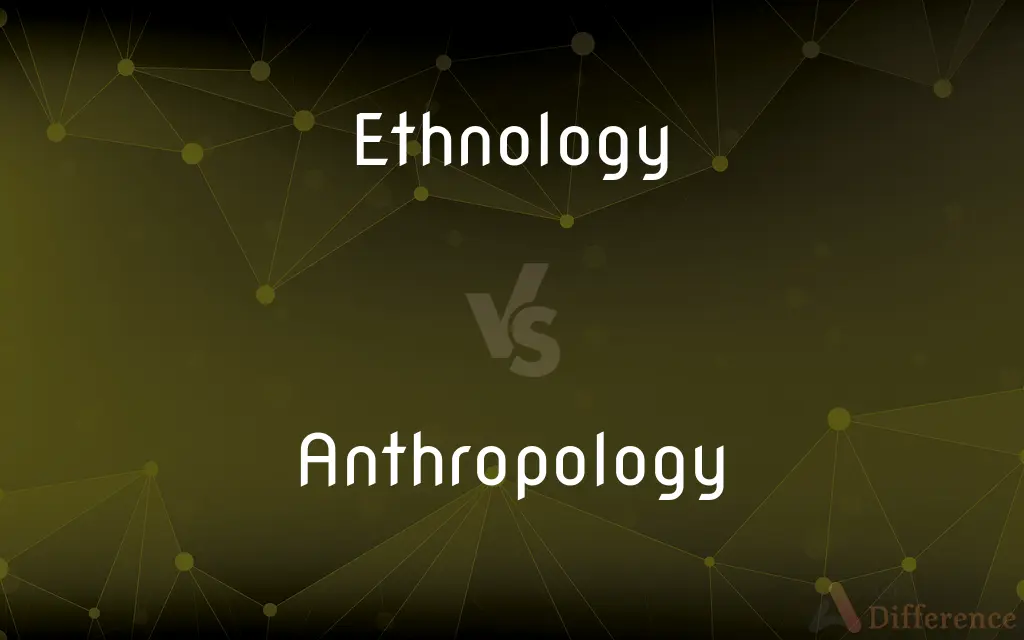Ethnology vs. Anthropology — What's the Difference?
Edited by Tayyaba Rehman — By Fiza Rafique — Updated on September 28, 2023
Ethnology studies cultural differences and similarities among human groups, while Anthropology is a broader field that studies human beings, cultures, and their evolution.

Difference Between Ethnology and Anthropology
Table of Contents
ADVERTISEMENT
Key Differences
Ethnology and Anthropology, while closely related, have distinct scopes and focuses. Ethnology dives deep into the study of human cultures by comparing and analyzing the characteristics of different peoples and their relational statuses. In contrast, Anthropology is the comprehensive study of humans, spanning biological, cultural, archaeological, and linguistic aspects.
Ethnology, as a subfield of Anthropology, concerns itself mainly with understanding the patterns, variations, and practices among various cultural groups. Anthropology, on the other hand, serves as an umbrella term that encompasses various subfields, including Ethnology, and studies human existence from the earliest beginnings to the present day.
One can view Ethnology as zooming into specific details of cultural phenomena, often involving direct fieldwork and interaction with communities. Anthropology, however, covers a broader spectrum, delving into both the physical evolution of humans and their cultural and social variations.
Comparison Chart
Focus
Cultural differences and similarities among humans
Comprehensive study of human beings and cultures
Scope
Subset of Anthropology
Broader field
ADVERTISEMENT
Methodology
Comparative study, often involving fieldwork
Encompasses fieldwork, lab work, archaeological digs, etc.
Topics Studied
Cultural practices, traditions, belief systems
Human evolution, culture, language, archaeology
Outcome
Understanding of cultural dynamics
Broad understanding of humanity and its history
Compare with Definitions
Ethnology
Ethnology seeks to understand patterns and variations in human cultures.
Ethnology revealed the shared ancestral stories among various island communities.
Anthropology
Anthropology combines fieldwork, archaeology, and theoretical studies.
His anthropology research combined ancient artifacts with oral histories to recreate the past.
Ethnology
Ethnology often requires immersive fieldwork.
Her ethnological research took her to remote villages to observe their daily practices.
Anthropology
Anthropology seeks to understand the entire spectrum of the human experience.
From ancient cave art to modern urban societies, Anthropology covers it all.
Ethnology
Ethnology is the study of cultural differences and similarities among human groups.
Through Ethnology, we can understand the rituals and traditions of indigenous tribes.
Anthropology
Anthropology is the study of human beings, their cultures, and their evolution.
Anthropology bridges our understanding of ancient civilizations to modern societies.
Ethnology
Ethnology involves a comparative approach to studying human cultures.
Ethnology helps in drawing parallels between the marriage customs of two distinct regions.
Anthropology
Anthropology provides insights into human behavior and societal structures.
Anthropology sheds light on why certain societal norms exist in various communities.
Ethnology
Ethnology can provide insights into societal structures and hierarchies.
Through ethnological studies, the matriarchal nature of the tribe became evident.
Anthropology
Anthropology encompasses both biological and cultural aspects of humanity.
Her degree in Anthropology equipped her with knowledge of human genetics and cultural practices.
Ethnology
Ethnology (from the Greek: ἔθνος, ethnos meaning 'nation') is an academic field that compares and analyzes the characteristics of different peoples and the relationships between them (compare cultural, social, or sociocultural anthropology).
Anthropology
Anthropology is the scientific study of humanity, concerned with human behavior, human biology, cultures and societies, in both the present and past, including past human species. Social anthropology studies patterns of behaviour, while cultural anthropology studies cultural meaning, including norms and values.
Ethnology
The branch of anthropology that analyzes and compares human cultures, as in social structure, language, religion, and technology; cultural anthropology.
Anthropology
The study of human societies and cultures and their development.
Ethnology
(anthropology) The branch of anthropology that studies and compares the different human cultures.
Anthropology
The scientific study of the origin, the behavior, and the physical, social, and cultural development of humans.
Ethnology
The science which treats of the division of mankind into races, their origin, distribution, and relations, and the peculiarities which characterize them.
Anthropology
That part of Christian theology concerning the genesis, nature, and future of humans, especially as contrasted with the nature of God
"changing the church's anthropology to include more positive images of women" (Priscilla Hart).
Ethnology
The branch of anthropology that deals with the division of humankind into races and with their origins and distribution and distinctive characteristics
Anthropology
The holistic scientific and social study of humanity, mainly using ethnography as its method.
According to anthropology, there are six basic patterns of kinship terminology (i.e., "kin naming systems"): Sudanese, Hawaiian, Eskimo, Crow, Omaha, and Iroquois.
Anthropology
The science of the structure and functions of the human body.
Anthropology
The science of man, including the study of the ditribution of physical and cultural attributes in relation to man's origin, location, history, and environment; - sometimes used in a limited sense to mean the study of man as an object of natural history, or as an animal.
Anthropology
That manner of expression by which the inspired writers attribute human parts and passions to God. See also anthropopathite, anthropopathism, anthropomorphist.
Anthropology
The social science that studies the origins and social relationships of human beings
Common Curiosities
How does Anthropology differ from Ethnology?
Anthropology is a broader field that studies humans, their cultures, and evolution, while Ethnology is a subset focusing on cultural patterns.
Is Ethnology considered a part of Anthropology?
Yes, Ethnology is a subfield within the broader discipline of Anthropology.
What is the main focus of Ethnology?
Ethnology primarily focuses on the cultural differences and similarities among human groups.
What subjects are covered in Anthropology?
Anthropology covers human evolution, culture, linguistics, archaeology, and more.
Is Anthropology only about past civilizations?
No, Anthropology studies both ancient and contemporary human societies.
What methods do anthropologists use?
Anthropologists use various methods, including fieldwork, archaeological digs, lab work, and theoretical studies.
Can Ethnology offer insights into modern societal issues?
Yes, Ethnology can provide valuable perspectives on contemporary cultural practices and challenges.
Does Ethnology only involve studying "primitive" or "tribal" societies?
No, Ethnology can study any cultural group, from urban communities to indigenous tribes.
Why is Ethnology important?
Ethnology helps understand cultural practices, traditions, and the dynamics of different human groups.
How does Ethnology contribute to Anthropology?
Ethnology offers detailed insights into cultural patterns, enriching the broader understanding of Anthropology.
Is there overlap between Ethnology and other disciplines?
Yes, Ethnology often intersects with sociology, history, and other social sciences.
Can someone be both an ethnologist and an anthropologist?
Yes, since Ethnology is a subfield of Anthropology, many professionals identify as both.
What is the significance of Anthropology in today's world?
Anthropology helps understand human behavior, societal changes, and cultural dynamics, which is vital in a globalized world.
Are anthropologists always field researchers?
Not always. While many anthropologists conduct fieldwork, some focus on lab research, theory, or teach.
Share Your Discovery

Previous Comparison
Creepy vs. Scary
Next Comparison
Penicillin vs. CephalosporinAuthor Spotlight
Written by
Fiza RafiqueFiza Rafique is a skilled content writer at AskDifference.com, where she meticulously refines and enhances written pieces. Drawing from her vast editorial expertise, Fiza ensures clarity, accuracy, and precision in every article. Passionate about language, she continually seeks to elevate the quality of content for readers worldwide.
Edited by
Tayyaba RehmanTayyaba Rehman is a distinguished writer, currently serving as a primary contributor to askdifference.com. As a researcher in semantics and etymology, Tayyaba's passion for the complexity of languages and their distinctions has found a perfect home on the platform. Tayyaba delves into the intricacies of language, distinguishing between commonly confused words and phrases, thereby providing clarity for readers worldwide.
















































